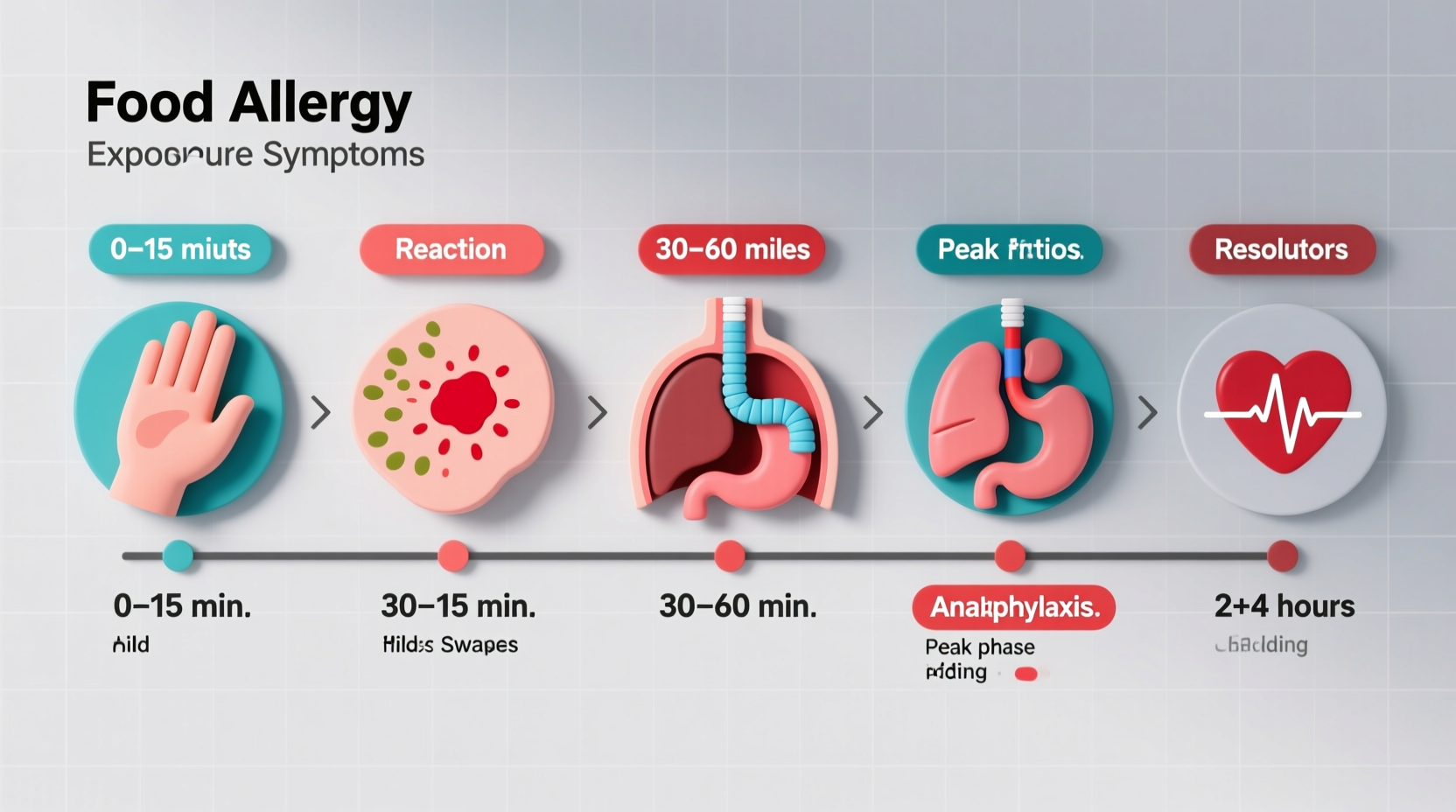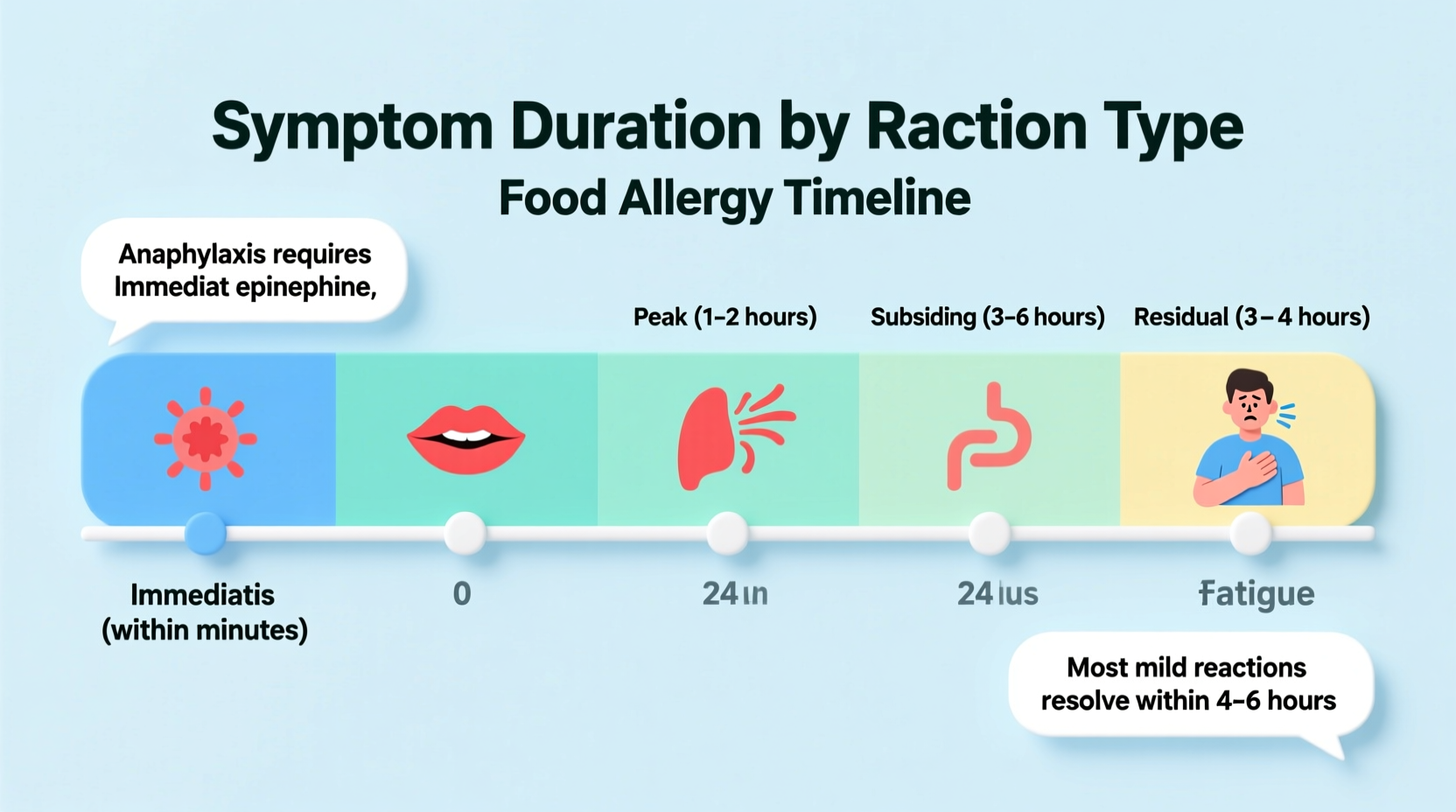Understanding how long food allergy symptoms persist is critical for determining appropriate treatment and when to seek emergency care. This comprehensive guide provides evidence-based information about food allergy symptom duration, factors affecting recovery time, and when to consult a medical professional.
Immediate Timeline of Food Allergy Reactions
Most food allergy symptoms begin within minutes of exposure, but the duration varies significantly based on reaction severity. According to the American Academy of Allergy, Asthma & Immunology, symptoms typically follow this progression pattern:
| Reaction Type | Onset Time | Typical Duration | Common Symptoms |
|---|---|---|---|
| Mild Reaction | 5-30 minutes | 30 minutes - 2 hours | Itching, hives, mild stomach discomfort |
| Moderate Reaction | 5-60 minutes | 2-6 hours | Swelling, vomiting, diarrhea, wheezing |
| Severe Reaction (Anaphylaxis) | Immediate - 30 minutes | Several hours (requires emergency treatment) | Difficulty breathing, throat swelling, drop in blood pressure |
| Biphasic Reaction | 1-72 hours after initial reaction | Several hours | Return of symptoms without re-exposure |
Why Food Allergy Symptoms Duration Varies
Several critical factors determine how long your food allergy symptoms will last. The Mayo Clinic identifies these key variables affecting symptom duration:
1. Type of Allergen Consumed
Different food proteins trigger varying immune responses. Common allergens and their typical symptom durations include:
- Peanuts and tree nuts: Often cause longer-lasting reactions (4-8 hours)
- Shellfish: Symptoms may persist 6-12 hours
- Milk and eggs: Typically shorter duration (2-4 hours)
- Wheat: Variable duration depending on individual sensitivity
2. Amount of Allergen Ingested
The National Institute of Allergy and Infectious Diseases confirms that larger exposures generally produce more severe and longer-lasting symptoms. Even trace amounts can trigger reactions in highly sensitive individuals, though these may resolve more quickly with proper treatment.
3. Treatment Received
Immediate epinephrine administration for severe reactions significantly reduces symptom duration. Antihistamines may alleviate mild symptoms but don't stop the underlying immune response. According to clinical studies published in the Journal of Allergy and Clinical Immunology, appropriate early treatment can reduce reaction duration by 30-50%.

Biphasic Reactions: The Hidden Danger
Approximately 1 in 5 food allergy reactions follow a biphasic pattern, where symptoms improve then return hours later without additional allergen exposure. The American College of Allergy, Asthma & Immunology reports that:
- Secondary reactions typically occur 1-72 hours after the initial reaction
- Over 80% happen within 8 hours of the first reaction
- These delayed reactions can be equally or more severe than the initial episode
This is why medical professionals recommend observation periods of 4-6 hours after severe reactions, even if symptoms initially improve. Never assume a reaction is over simply because symptoms seem to be resolving.
When to Seek Immediate Medical Attention
While most mild food allergy symptoms resolve within hours, certain warning signs require emergency care regardless of duration:
- Difficulty breathing or wheezing
- Swelling of the throat or tongue
- Dizziness or fainting
- Vomiting that prevents taking medication
- Symptoms that worsen despite treatment
The Centers for Disease Control and Prevention emphasizes that anaphylaxis is a medical emergency requiring immediate epinephrine administration and emergency medical services.
Managing Prolonged Food Allergy Symptoms
If symptoms persist beyond 24 hours, consult an allergist. Extended symptoms may indicate:
- Continued allergen exposure (hidden ingredients)
- Secondary complications like gastrointestinal inflammation
- Co-occurring conditions such as food protein-induced enterocolitis syndrome (FPIES)
For persistent mild symptoms, your healthcare provider may recommend:
- Continued antihistamine use
- Dietary modifications during recovery
- Follow-up testing to confirm the specific allergen
Preventing Future Reactions
Understanding your typical reaction duration helps develop an effective emergency plan. Work with an allergist to:
- Identify your specific food triggers through testing
- Develop a personalized emergency action plan
- Learn proper epinephrine auto-injector use
- Understand hidden sources of your allergens
Remember that reaction patterns can change over time. Regular follow-up with an allergy specialist ensures your management plan remains appropriate as your condition evolves.
Frequently Asked Questions
Can food allergy symptoms last for days?
While most food allergy symptoms resolve within 24 hours, certain reactions can persist longer. Gastrointestinal symptoms from food protein-induced enterocolitis syndrome (FPIES) may last 24-48 hours. Biphasic reactions can cause symptoms to return up to 72 hours after the initial exposure. Persistent symptoms beyond 72 hours typically indicate a different condition requiring medical evaluation.
Do food allergy symptoms get worse each time?
Reaction severity doesn't necessarily increase with each exposure. The American Academy of Allergy, Asthma & Immunology states that reaction severity varies based on multiple factors including amount of allergen consumed, your current health status, and concurrent illnesses. Some people experience consistently similar reactions, while others have variable responses.
How long after eating can food allergy symptoms start?
Most food allergy symptoms begin within minutes of exposure, but can sometimes take up to 2 hours to appear. In rare cases, delayed food allergy reactions may manifest 2-6 hours after consumption. Immediate reactions (within minutes) are typically IgE-mediated allergies, while delayed reactions may indicate non-IgE mediated responses.
Can food allergy symptoms come back after going away?
Yes, approximately 20% of food allergy reactions follow a biphasic pattern where symptoms improve then return without additional allergen exposure. The American College of Allergy, Asthma & Immunology reports that secondary reactions typically occur 1-72 hours after the initial reaction, with most happening within 8 hours. This is why medical observation periods are recommended after severe reactions.
Does drinking water help food allergy symptoms?
Drinking water may help mild symptoms by diluting stomach contents and maintaining hydration, especially if vomiting or diarrhea occurs. However, water does not stop the allergic reaction process. For moderate to severe reactions, epinephrine is the only effective treatment. Water alone cannot treat anaphylaxis or significantly shorten reaction duration.











 浙公网安备
33010002000092号
浙公网安备
33010002000092号 浙B2-20120091-4
浙B2-20120091-4